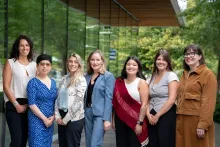
Upcoming Event: Health After 2020 Dialogue Session - Cross-Institutional Collaborations to Address the Unregulated Drug Crisis
UBC Health hosts Health After 2020 dialogue sessions throughout the year to highlight the work of interdisciplinary health teams at UBC who received funding through the Health After 2020 program.
Health After 2020 Dialogue Session: Cross-institutional Collaborations to Address the Unregulated Drug Crisis
Tuesday 26 November, 2024
Online
14:00-15:00 pm
Overview
Drug checking is an evidence-based harm reduction intervention that identifies the ingredients in substances, allowing the users to make informed choices and helping monitor their drug supply. Amidst BC’s worsening toxic drug crisis, it is critical to explore how evolving educational and healthcare innovations can contribute to the development of such impactful interventions.
The role of cross-institutional collaboration
Researchers at the University of Victoria and UBC’s Okanagan campus have facilitated drug checking services at community sites and festivals gaining unique insights and skills through collaboration with technicians from other sites. A Health After 2020 grant enabled these researchers to deepen their understanding of how cross-institutional collaborations enhance equitable learning opportunities within the drug checking field. By sharing technician experiences, conducting site visits, and engaging in festivals-based work, they identified key facilitators and barriers that influence technician learning and growth.
About the Session
In this one-hour session on 26 November, a panel of experts will share the research team’s learnings, including how institutions might better collaborate to address equity and training gaps to support the growth of drug checking services. As this intervention has shown to reduce harm among individuals using unregulated substances, these discussions are essential to advancing health efforts.
About Health After 2020
This dialogue session is part of the Health After 2020 program at UBC Health which supports interdisciplinary and cross-institutional projects designed to improve health producing systems. Inspired by the wide-reaching effects of the COVID-19 pandemic, Health After 2020 fosters collaborations that deepen our understanding of the health and wellbeing determinants, creating opportunities for innovative solutions for complex health challenges
Speakers
- Lauren Airth, PhD, RN, School of Nursing, HaRT, Hein Lab, Faculty of Health and Social Development, UBC Okanagan; Drug Checking Technician; BC Centre on Substance Use
- Bruce Wallace, PhD, MSW, Professor, School of Social Work, Scientist, Canadian Institute for Substance Use Research, University of Victoria
- Jordyn Cates, Doctoral Student, HaRT, Department of Psychology, Irving K. Barber Faculty of Arts and Social Sciences, UBC Okanagan; Drug Checking Technician
- Piotr Burek, Masters Student, Drug Checking Technician, Substance Drug Checking, Canadian Institute for Substance Use Research, The University of Victoria
- Katy Booth, MSW, RSW, Site Coordinator - Substance Drug Checking, Canadian Institute for Substance Use Research, University of Victoria
- Lukas Bichler, PhD, MASc, BEng, Professor, Scientific Director for Cleantech Hub, Faculty of Applied Science, UBC Okanagan



